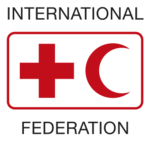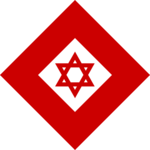
RED – The Cross, The Crescent, The Crystal
Human trafficking is big business, and while some hide under the umbrella of charities, most fly under the radar. Blood donations are only a small part of these monopolies that help inflate their size. What if we told you these Red organizations aren’t exactly what they seem? Let’s explore…
Who / What Is The Red Cross, Red Crescent, and Red Crystal Societies
The International Federation of the Red Cross and Red Crescent Societies operate in 190 countries in Africa, Americas, Asia, Pacific, Europe, Middle East and North Africa. Since 2005, an additional symbol was created called the Red Crystal.




The Red Cross is a multi layered organization that enjoys special status like a non-governmental sovereign entity. You read that right. They operate like a mini state. They have their own rules & issue their own passports. Their members are free to travel anywhere without question. Think diplomatic immunity. Of course officially they say they don’t operate as a non-governmental sovereign entity, but when you look into it deeper, you’ll come across the following that contradicts that status:
The ICRC has special privileges and legal immunities in many countries,[which?] based on national law in these countries, based on agreements between the ICRC and the respective governments, or, in some cases, based on international jurisprudence (such as the right of ICRC delegates not to bear witness in front of international tribunals).
Let’s go even deeper. From Cambridge University:
… For instance, the [ICRC], a private non-governmental organisation subject to Swiss law, was granted specific functions under the 1949 Geneva Red Cross Conventions and has been accepted as being able to enter into international agreements under international law with international persons”). See also Christian Walter, “Subjects of International Law”, in Max Planck Encyclopedia of Public International Law, Oxford University Press, Heidelberg and Oxford, 2012, para. 7, available at www.mpepil.com (referring to “atypical subjects of international law” such as the Holy See, the Sovereign Order of Malta and the ICRC, whose “role in the promotion and implementation of the laws of war has led it to being endowed with specific functions under the 1949 Geneva Conventions. It has also entered into international treaties with a number of States and international organizations such as the UN”)
[…] For example, at the time of writing, the ICRC enjoyed privileges and immunities – through bilateral status agreements or on the basis of domestic legislation – in 103 countries, and was negotiating status agreements granting privileges and immunities in a further thirteen countries (numbers are up to date until 1 April 2015). In at least four countries, the ICRC and its staff, in the absence of formal privileges and immunities, are de facto treated as (officials of) an IO. In the international legal order, the ICRC enjoys status and treatment as or equivalent to that of a classic IO with almost thirty international and regional intergovernmental organizations (usually through observer status as an IO). It also enjoys privileges and immunities before all international criminal tribunals.. For more detail on the specific privileges and immunities of the ICRC, see the section “Privileges, Facilities and Immunities Necessary for the ICRC to Carry Out Its Mandate”, below.
On paper they might not be registered as a non-governmental sovereign entity, but with all the agreements they’ve made with countries around the world, their privileges gives them the same – if not more – access to international sovereignty than if they had been.
Exhibit 1:
This document released in 2007 by the Red Cross in Geneva shows the given passport to a Nazi war criminal used to enter Argentina in 1950.
How Powerful Are the Red Cross?
An international agreement protects the full sanctity of all ICRC property in Switzerland including its headquarters & archives, grants members & staff legal immunity, exempts the ICRC from taxes & fees, guarantees the protected & duty-free transfers of goods, services, & money, provides the ICRC with secure communication privileges at the same level as foreign embassies, and simplifies committee travel in & out of Switzerland.
It seems to be nicely set up for any kind of international trafficking. Don’t you think?
Blood Is Big Business
The Red Cross are big on blood donations and blood transfusions. They set up their first blood donation service in the UK, which has now separated off as its own organization. In Israel, one of the main activities of the Red Crystal society is to collect blood and run blood banks. Blood is their business. And blood business is now normalised and acceptable across the world. Some blood is more favored than others, as in Europe and the US. The prized blood being O negative.
From BCC Research published May-2017:
The Global Blood Industry
The global sales of blood products reached $31.8 billion in 2015 and $33.5 billion in 2016. The market is expected to grow at a five-year compound annual growth rate (CAGR) of 4.9% from 2016 to 2021, reaching nearly $42.6 billion in 2021.
People go missing quite easily in disasters among the chaos that is created. This is one of the main activities of the Red Cross. They act as a central resource for locating missing persons. That’s the same set up as ICMEC (International Center for Missing & Exploited Children). The Red Cross seems set up to traffic a different group of people, “vulnerable people”, people displaced and traumatized by disaster, manufactured disaster. What better disguise than a charity?
Procurement Is Big Business
They have “Humanitarian Procurement Centers”. Their main objective is value for money (great ethos). The language used on their website and on Wikipedia is very ambiguous. Rarely do they state what they are procuring, but the word “humanitarian” is frequently used next to the word “procurement”.
From the International Federation of Red Cross and Red Crescent Societies:
Our mission is to provide effective and high quality procurement services to all members of the International Red Cross and Red Crescent Movement.
We are expanding our procurement services to third parties through our status as a humanitarian procurement centre and through our normal service mechanisms. We endeavour to provide best value for money to all our customers through fair competition and transparent procedures.
Humanitarian procurement centers
The International Federation is expanding to third parties the procurement services it already provides to National Societies. Key to this is our accreditation by the Directorate General for Humanitarian Aid (DG ECHO) as a humanitarian procurement centre.
War Is Big Business
The Red Cross were very active in WW2. They were allowed into the camps for “humanitarian” reasons while collecting data on missing persons. They were part of the Nazi regime, and part of the experiment on human beings. They also kept the camps a secret.
From the Encyclopedia of World Poverty, Volume 1:
“During World War II, 179 delegates conducted 12,750 visits to prisoner-of-war (POW) camps in 41 countries and 120 million messages were exchanged. The Central Information Agency on Prisoners-of-War had a staff of 3,000, and a card index that tracked prisoners contained 45 million names.”
Swiss historian Jean-Claude Favez, who conducted an 8-year review of the Red Cross records, says that even though the Red Cross knew by November 1942 about the Nazi’s annihilation plans for the Jews – and even discussed it with U.S. officials – the group did nothing to inform the public, maintaining silence even in the face of pleas by Jewish groups.
The Red Cross & The Rothschilds
From the Rothschild Archive:
The Rothschild family has been closely associated with the British Red Cross since its inception in 1870 when Nathaniel, 1st Lord Rothschild (1840-1915) became one of the founder members of the committee of the National Society for Aid to the Sick and Wounded in War. He became chairman of the Society on the death of the founder chairman in 1901, and he held the post until his death in 1915. He was a key figure in the reorganisation of the Society into the British Red Cross in 1905. His son, Charles (1877-1923), was one of the first Council members of the newly formed British Red Cross from 1905, serving until his death in 1923. He took an active role, establishing financial systems and national procedures for the Society in 1909 and serving on the Executive Committee at the time of the First World War. Marie, Mrs Leopold de Rothschild (1862-1937) was twice mentioned in despatches during the First World War in connection with her work as President of the Middlesex Branch of the British Red Cross Voluntary Aid Detachment (VAD). She was also involved in the establishment of the Aylesbury Military Hospital, and was made a CBE for her work for the war effort.
The Piggy Bank
Feel Sick Yet?
The Red Cross has a global monopoly on the disaster industry while sucking the blood out of every tax payer to help fund it. US taxpayers are paying for it all. Feel sick yet?
Leave a comment below and let us know your thoughts. And as always, God bless America and long live the republic.
⠀⠀⠀⠀⠀⠀⠀⠀
⠀ . ╚⊙ ⊙╝⠀⠀⠀⠀⠀⠀⠀⠀⠀
..╚═(███)═╝⠀⠀⠀⠀⠀⠀⠀⠀⠀
.╚═(███)═╝⠀⠀⠀⠀⠀⠀⠀⠀⠀
╚═(███)═╝⠀⠀⠀⠀⠀⠀⠀⠀⠀
.╚═(███)═╝⠀⠀⠀⠀⠀⠀⠀⠀⠀
..╚═(███)═╝
Help Centipede Nation Stay Online
Stories like these are made possible by contributions from readers like you. If everyone who enjoys our website helps fund it, we can keep our platform alive and expand our coverage further.












